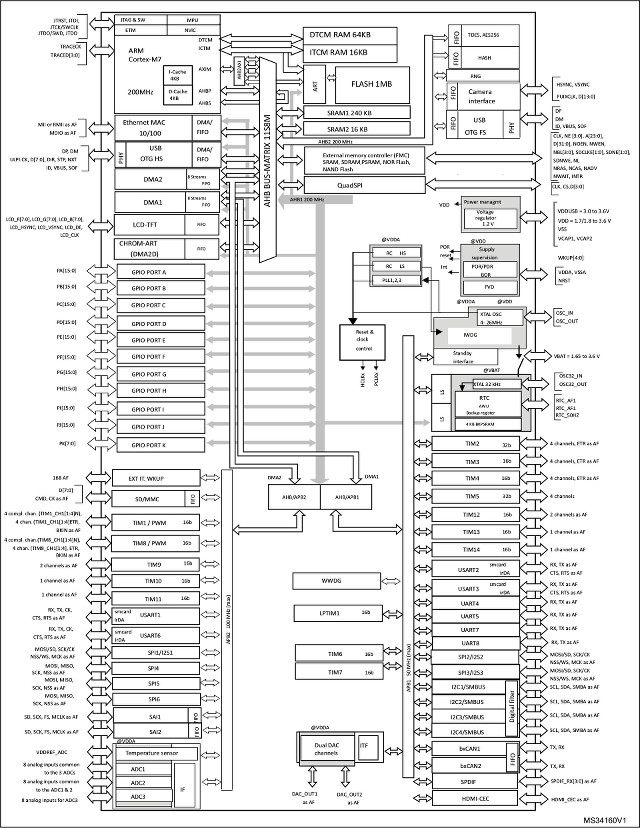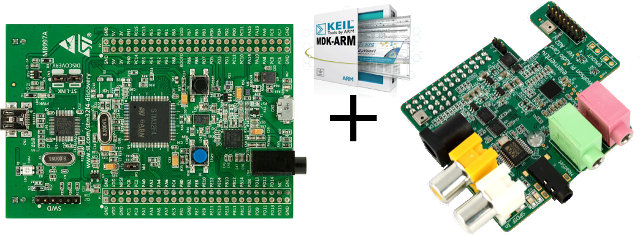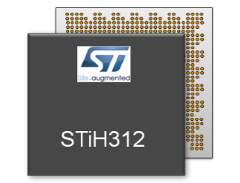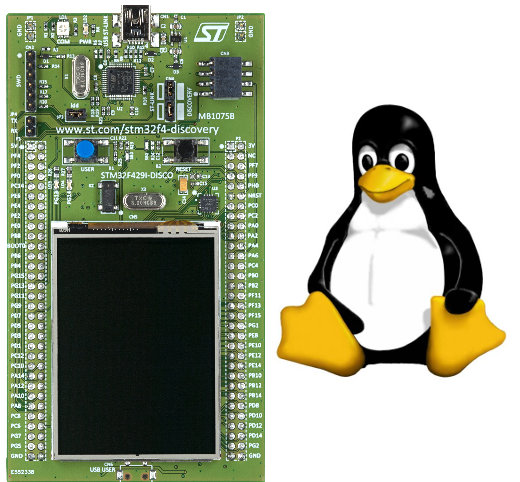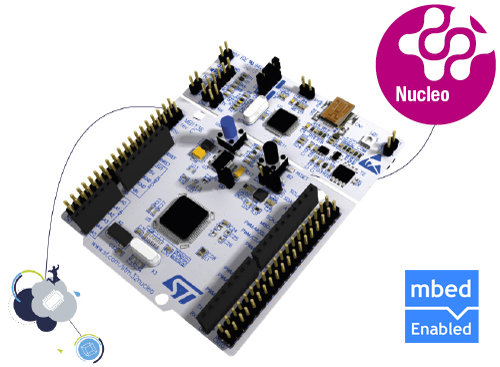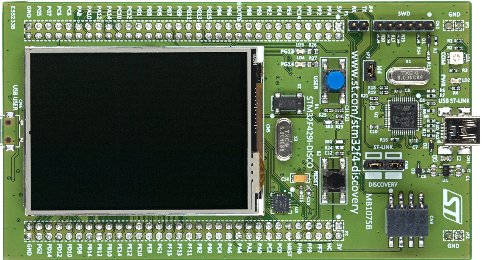STMicro announced their latest STM32F7 micro-controller family based on ARM Cortex M7 last week. As ARM Techcon 2014 is now taking place, the company has uploaded an infomercial on their YouTube account, where STMicro and ARM representatives are interviewed about the new family, and talk about its performance, power consumption, target applications, business prospects, and so on. But there’s also an a short demo with two development kits one with a STM32F4 cortex M4 micro-controller, and the other with a STM32F7 micro-controllers. Since both MCU families are pin-to-pin compatible, the hardware is identical except for the MCU. Both kits are pre-loaded with a 3D graphics demo (ray tracer), and the board with STM32F7 completes the demo in about half the time of the one with STM32F439, allegedly with about the same power consumption (7 coremarks / mW). The video is about 8 minutes long, and the demo starts at 1:25. […]
STMicro STM32F7 Series is the First ARM Cortex-M7 MCU Family
Right after ARM’s Cortex-M7 announcement, STMicro has listed STM32F7 MCU family based on the latest ARM core on their website. The family is comprised of 20 different MCUs with various flash size, packages, and with or without a crypto/hash coprocessor. The company expects their STM32F756xx microcontrollers to be used for motor drive and application control, medical equipment, industrial applications such as PLC, inverters, and circuit breakers, printers & scanners, alarm systems, video intercom, HVAC, home audio appliances, mobile applications, Internet of Things application, and wearable devices such as smartwatches. STM32F7 MCUs share the following key features: Cortex-M7 core @ 200 Mhz (1000 CoreMark/428 DMIPS) with L1 cache (4KB I-cache, 4KB d-cache) 320KBytes of SRAM with scattered architecture: 240 Kbytes of universal data memory a 16 Kbytes partition for sharing data over the bus matrix 64 Kbytes of Tightly-Coupled Data Memory (DTCM) for time critical data handling (stack, heap…) 16 Kbytes […]
Linaro 14.06 Release with Linux Kernel 3.15 and Android 4.4.3
Linaro 14.06 has been released last week with Linux Kernel 3.15 (baseline), Linux Kernel 3.10.44 (LSK), and Android has been updated to 4.4.3. One interesting development this month is that Android for ARMv8 (64-bit ARM) is booting on the fast models using ARM Trusted firmware and U-Boot. SELinux has been enabled in Android. I could not see much new member hardware, except possibly B2120 (HDK) reference board for STMicro STiH407 “Monaco” STB SoC. Here are the highlights of this release: Linux Linaro 3.15-2014.06 GATOR version 5.18 (same version as in 2014.04) updated basic Capri board support from Broadcom LT cortex-strings-arm64 topic (same as in 2014.02) updated Versatile Express ARM64 support (FVP Base and Foundation models, Juno) from ARM LT. updated Versatile Express patches from ARM LT more HiP0x Cortex A15 family updates from HiSilicon LT (hip04_eth, hip04_defconfig) updated LLVM topic Big endian support (same as in 2014.05) ftrace_audit topic from […]
ARM Introduces DSP ‘Lab-in-a-Box’ For Education Combining STMicro STM32F4-Discovery Board and Wolfson Audio Card
DSP (Digital Signal Processing) courses at University have traditionally used software simulation packages (Matlab), or hands-on labs using development kits costing around $300 per student. In order to reduce costs, ARM University program and their corporate partners have launched a DSP ‘Lab-in-a-Box’ so that university students can learn DSP and audio systems with hardware selling for about $50, or over 80% cheaper than previous educational hardware. A typical DSP Lab-in-a-Box (LiB) would come with: STMicroelectronics ARM Cortex-M4-based STM32F4 Discovery MCU board Wolfson Microelectronics and Farnell element14 Wolfson Audio Card. ARM Keil MDK-Professional development tool with a 1-year renewable software license. Teaching materials such as lecture slides, code samples, and hands-on lab manuals. STM32F4-Discovery board features an STM32F407VGT6 MCU (ARM Cortex-M4F core) with 1 MB Flash, and 192 KB RAM, sensors (motion and accelerometer), a digital microphone, and audio DAC, a micro USB connector, and various buttons and LEDs. The Wolfson […]
New ARM Set-Top Box SoCs – Sigma Designs SMP8734 / SMP8756, STMicro STiH312 / StiH412, and Entropic EN7310 (Videos)
Broadcom and STMicro has the two companies that dominate the set-top box SoC market with respectively 44.7% and 34% market share by revenue in 2012, followed by Ali, a distant third at 6.9%. Other companies include Entropic, who has acquired Trident Systems, (4.4%) and Sigma Designs (1.4%) which has suffered in recent years. MIPS was the predominant architecture in the STB SoC market, but with the advent of Android, most companies have announced ARM based STB SoC for better compatibility with Android apps. TV Connect 2014, an event gathering stokeholder involved in Connected TV such as STB manufacturers, content providers, and SoC vendors, took place on March 18-20 in London, and Charbax, armdevices.net, interviewed three companies who promoted their latest ARM based STB SoCs: Sigma Designs with their SMP5734 & SMP8756/58 SoCs featuring single or dual cores Cortex A9 and a Mali-400 GPU STMicro with their STiH312 Cannes and STiH412 Monaco […]
U-Boot & Linux BSP for STMicro STM32 Discovery Board
If you want to run Linux on STM32 Discovery board, more exactly STM32F429 Discovery board, it’s now possible thanks to Emcraft Systems’ BSP for STM32F429 Discovery Board. It will only work on that particular version of the discovery board as it features 64Mbit external SDRAM, which is required for uClinux, and missing on other STM32 Discovery boards. You can either get u-boot and (uC)Linux from the company’s github account which contains the required patches, but lacks complete documentation, and a default config file for the kernel for example, or purchase a BSP ($33) with 3-month support, and pre-built u-boot and Linux binaries. There’s also publicly available documentation explaining how to flash the bootloader and the kernel among other things, and links to relevant external resources, without the need to spend any money. Jean-Luc Aufranc (CNXSoft)Jean-Luc started CNX Software in 2010 as a part-time endeavor, before quitting his job as a […]
STMicro Unveils $10 mbed-enabled and Arduino Compatible Nucleo Development Boards
STMicro already announced a $24 NFC development kit a few days ago, and they’ve now announced new ultra low cost STM32 development boards. STMicro Nucleo development boards are based on different STM32 MCU based on ARM Cortex M0, M3 and M4, feature Arduino headers, and are supported by mbed platform. There are currently four boards available: NUCLEO-F401RE – Based on STM32F401RET6 ARM Cortex M4 MCU @ 84 MHz with 512KB flash memory, 96 KB SRAM NUCLEO-F030R8 – Based on STM32F030R8T6 ARM Cortex M0 MCU @ 48 MHz with 64KB flash memory, 8KB SRAM NUCLEO-F103RB – Based on STM32F103RBT6 ARM Cortex M3 MCU @ with 128KB flash memory, 20 KB SRAM NUCLEO-L152RE – Based on STM32L152RET6 ARM Cortex M3 MCU @ 32MHz with 512KB flash memory, 32KB SRAM All four boards share the following specifications: STM32 microcontroller with LQFP64 package Two types of extension resources Arduino Uno Revision 3 connectivity STMicroelectronics […]
Free Online Courses & Workshops For ARM Cortex-M Microcontrollers
STMicroelectronics and Digikey are co-sponsoring an EE Times University online training course entitled “Fundamentals of Microcontrollers (MCUs): Hands-On Workshop”. The first two 45-minutes sessions will be theoretical and provide and overview of micro-controllers, and explain methods to select an MCU for a given project. The first 1,000 persons based in the US or Canada, who attended the first 2 sessions, will receive a free STM32F4 Discovery Board (ARM Cortex M4). The three next sessions, conveniently taking place about a week later, hopefully after you’ve received your board, will be an actual workshop with STM32F429 Discovery Board. Here’s the detailed schedule for the training: December 2, 2013, 12PM (Eastern Time) – Session 1 – Introduction to Microcontrollers Common microcontroller architectures Pipelining Peripherals: Timers, Communication, Analog December 3, 2013, 12PM (Eastern Time) – Session 2 – Selecting the Right Microcontroller 10 Steps to Selecting a microcontroller What to look for in a […]



